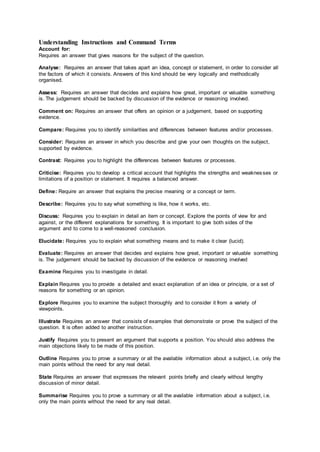
Understanding Instructions And Command Terms
- 1. Understanding Instructions and Command Terms Account for: Requires an answer that gives reasons for the subject of the question. Analyse: Requires an answer that takes apart an idea, concept or statement, in order to consider all the factors of which it consists. Answers of this kind should be very logically and methodically organised. Assess: Requires an answer that decides and explains how great, important or valuable something is. The judgement should be backed by discussion of the evidence or reasoning involved. Comment on: Requires an answer that offers an opinion or a judgement, based on supporting evidence. Compare: Requires you to identify similarities and differences between features and/or processes. Consider: Requires an answer in which you describe and give your own thoughts on the subject, supported by evidence. Contrast: Requires you to highlight the differences between features or processes. Criticise: Requires you to develop a critical account that highlights the strengths and weaknesses or limitations of a position or statement. It requires a balanced answer. Define: Require an answer that explains the precise meaning or a concept or term. Describe: Requires you to say what something is like, how it works, etc. Discuss: Requires you to explain in detail an item or concept. Explore the points of view for and against, or the different explanations for something. It is important to give both sides of the argument and to come to a well-reasoned conclusion. Elucidate: Requires you to explain what something means and to make it clear (lucid). Evaluate: Requires an answer that decides and explains how great, important or valuable something is. The judgement should be backed by discussion of the evidence or reasoning involved Examine Requires you to investigate in detail. Explain Requires you to provide a detailed and exact explanation of an idea or principle, or a set of reasons for something or an opinion. Explore Requires you to examine the subject thoroughly and to consider it from a variety of viewpoints. Illustrate Requires an answer that consists of examples that demonstrate or prove the subject of the question. It is often added to another instruction. Justify Requires you to present an argument that supports a position. You should also address the main objections likely to be made of this position. Outline Requires you to prove a summary or all the available information about a subject, i.e. only the main points without the need for any real detail. State Requires an answer that expresses the relevant points briefly and clearly without lengthy discussion of minor detail. Summarise Requires you to prove a summary or all the available information about a subject, i.e. only the main points without the need for any real detail.
- 2. To what extent….Requires you to discuss and explain the ways in which something is true, but also the ways in which it is not true. Other common words used in questions Concept An important idea. Concise Short, brief. In the context of Referring to, in relation to the subject of. Criteria What requirements or standards are needed or expected. Deduction The conclusions or generalisations that you come to after looking carefully at the facts. Factor(s) The circumstances bringing about or influencing a result. Function What something does: its purpose or activities. Implications Results that are not obvious but are the knock-on effects of something. With reference to Make sure you write about the subject. In relation to Only a certain part of the topic needs to be discussed. Role The part something plays, how it works, its purpose. Significance Meaning and importance of something. Limitations Explain where something is not used or is irrelevant.
